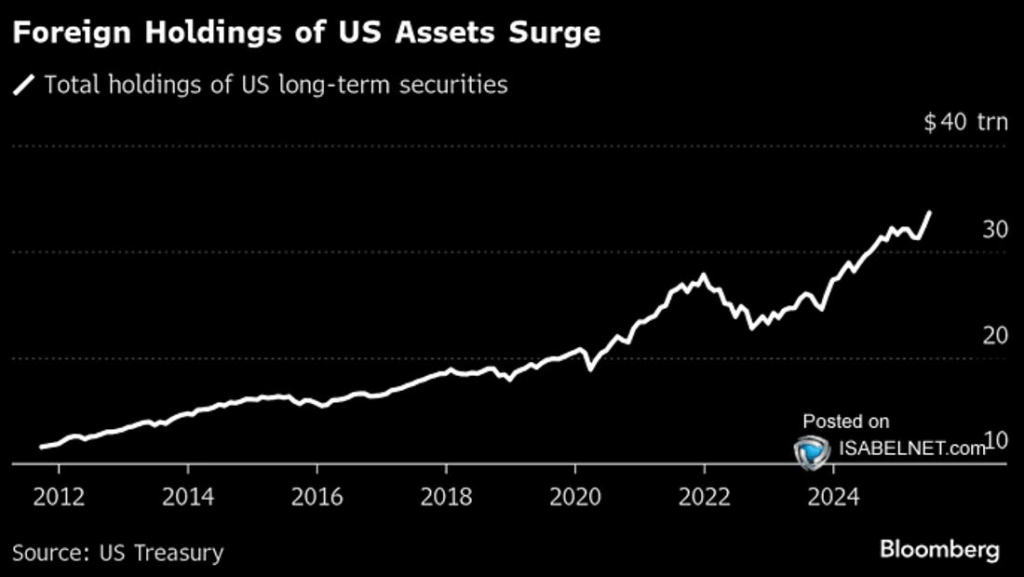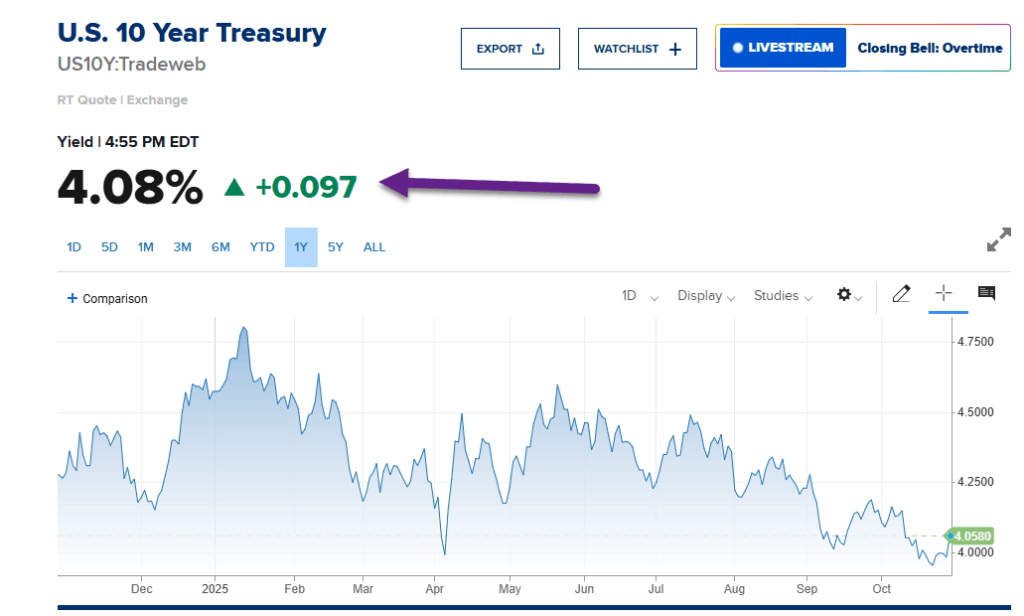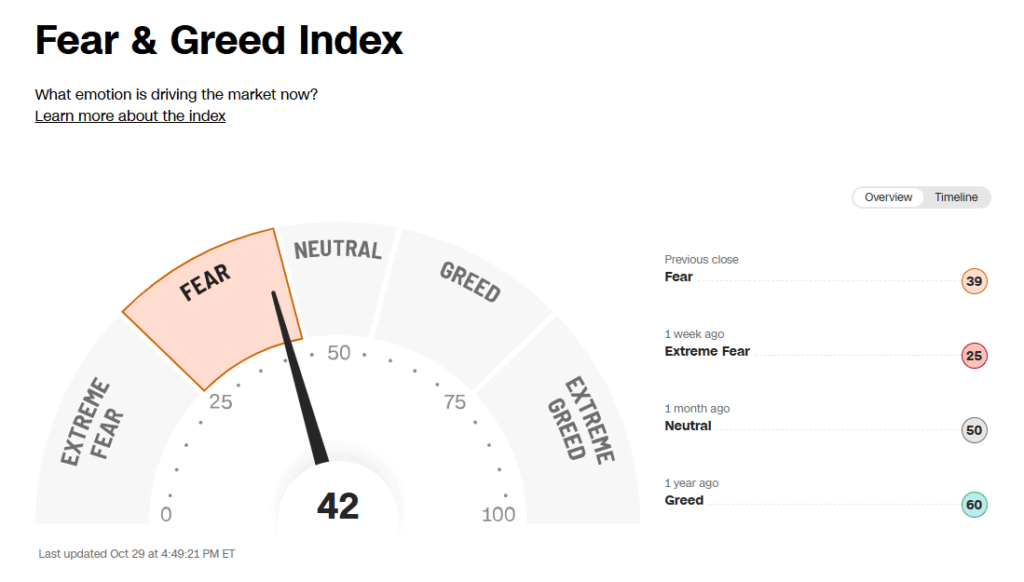1. The S&P has Hit 40+ Record Highs This Year..What Happens Next?
Nasdaq Dorsey Wright In yesterday’s trading, the S&P 500 (SPX) reached a new all-time high for the 43rd time in 2025. While this is an impressive feat, it still puts the index behind last year’s pace when it notched 51 record highs by the end of October, on its way to 62 high watermarks for the year. With the S&P possibly on track to hitting 50 records in back-to-back years, we were reminded of an article published in Bloomberg around this time in 2023, the first year in a decade that S&P didn’t reach a new all-time high.

2. Yesterday’s Top 10 Had Record Foreign Holdings of U.S. Stocks….Foreign Holdings of U.S. Overall Assets are Surging.

Source: Isabelnet
3. Equal Weight Underperforming Market Cap Weighted by Biggest Margin Ever

Barchart
4. CSCO Max Market Cap 1999 vs. NVDA 2025

Michael J. Kramer
5. In One Day…..Fiserv Gave Back All Stock Gains Going Back to 2016

Google Finance
6. 10-Year Treasury Yield Trending Back Up

CNBC
7. The Era of Negative Bonds Yields is Officially Over

The Kobeissi Letter
8. CNN Fear and Greed Index is in Fear

CNN
9. Healthcare Premiums for Average U.S. Family

10. Beep. Boop. Busted. Here’s how math nerds caught the NBA’s Terry Rozier
USA TODAY
The numbers did not compute.
Even before Terry Rozier dropped out of the 2023 NBA game in which he’s accused of rigging his statistics, computers at an “integrity monitor” firm flagged a flood of bets that did not match a mathematical model of how this game should go. The company, now called IC360, alerted the NBA and sportsbooks about the unusual bets coming in on Rozier’s performance.
The investigation that led to the arrest of the Miami Heat point guard and dozens of others for illegal gambling started with math. It ended Oct. 23 with Rozier charged with manipulating his performance in that 2023 game so that gamblers in the know could win tens of thousands of dollars.
Beep. Boop. Busted.
Federal authorities allege more than $200,000 poured in betting that Rozier would turn in a below-average performance in that game after Rozier told another defendant he would drop out of the game early with an injury. Rozier played 9 minutes, 34 seconds for the Charlotte Hornets in the game against the New Orleans Pelicans before leaving with an injury and finished under his usual totals for points, assists and 3-pointers.
Earlier this year, similar mathematical models flagged unusual betting on individual pitches thrown by Cleveland Guardians pitchers Emmanuel Clase and Louis Ortiz. Both were placed on indefinite leave.
How do you use math to catch a cheater?
Detection starts with prediction.
“When you do the odds compiling, you have a predicted model for how you expect the game to go,” said Chris Rasmussen, who teaches sports integrity at the University of New Haven and has spent years investigating sports betting fraud for the World Lotteries Association.
Based on the data behind the teams and players in the game, the model expects certain points for those players and predicts “expected behaviors.” When real-world betting behavior starts to deviate from the model’s prediction, that’s when “we are starting to look,” Rasmussen explained. “Why does it deviate, and how much does it deviate, and what’s going on?”
Bookmakers, the businesses or platforms that take bets on sporting events, often work with integrity monitors like IC360 that analyze sports and betting data across the market and flag unusual activity.
“It’s not necessarily the sportsbook’s job to prove cheating,” said Frank DiGiacomo, an attorney who practices law in gaming, sports betting, and lottery. “Their obligation is to flag a situation and report it.” Then, state regulators could launch investigations with law enforcement.
The monitoring model analyzes expected behavior and tracks outliers, numbers outside the expected range, whether they come from events in the game itself or from people placing unexpected bets on it. Then the model signals when it detects something more than luck at work.
A new account placing a maximum bet immediately raises red flags. “That’s really weird,” Rasmussen said. A new bettor would probably place $10, $15 or $20 in a new account, he said, not thousands of dollars.
Similarly, if an existing account that typically bets $50 on certain games suddenly places a $1,000 bet, that outlier behavior could trigger an investigation.
“Of course, you can be lucky one time,” Rasmussen said. “But if you keep being lucky, there’s probably something in it.”
How hard is it to catch cheaters?
Since the Supreme Court overturned the federal ban on sports betting in 2018, 39 states plus Washington, D.C., and Puerto Rico have legalized some form of sports gambling.
With hundreds of thousands of bookmakers today, Rasmussen said cheating in sports betting is harder to catch because there are more betting opportunities. While bettors once could only bet on major games, they can now bet on games from college sports to eSports, and there are more ways to hide.
“The criminals are working 24/7,” he said, “and we in law enforcement and so on are working … not the same as the criminals.
Rasmussen emphasized the importance of human monitors to identify cheating, even though algorithms and artificial intelligence can process vast amounts of data.
“You still need a human behind,” he said. “You really need to understand the betting market… You need to understand what prop bets, the handicap, and so on mean, and you need to understand that there’s also the local aspect… There’s a difference from Chicago to LA to New York.”
Prop bets, which stand for proposition bets, allow bettors to wager on specific events or outcomes within a game rather than the final result—betting on who scores first, for example. Or whether Terry Rozier performs under his average stats. Or whether Louis Ortiz will throw an outside slider.
To DiGiacomo, the sports betting lawyer, a “fundamental trust that the games are fair and results are fair” is the core of the sports betting industry.
“Otherwise, people will not bet if they think the match is rigged,” he said.
If a gaming operator fails to notify a regulator, the consequences can be warnings, fines, and ultimately losing their license. “Licenses are their lifeblood, so operators take that seriously,” DiGiacomo said.
The same goes for players, but the consequences can be severe and career-ending. Given the salaries professional athletes could earn today, “losing years or perhaps being banned from a sport is a significant financial penalty, probably, I would assume, more significant than what they could win on a bet,” he added.
With Rozier’s arrest making headlines, athletes “will certainly, or should certainly” know that they’re not going to be able to get away with the regulated sports betting system, DiGiacomo warned.
“It’s a sad day for sports and for sports betting,” he said. “But I would say, this is the system working.” https://www.usatoday.com/story/news/nation/2025/10/24/nba-rozier-betting-cheating-math-monitors/86857550007/